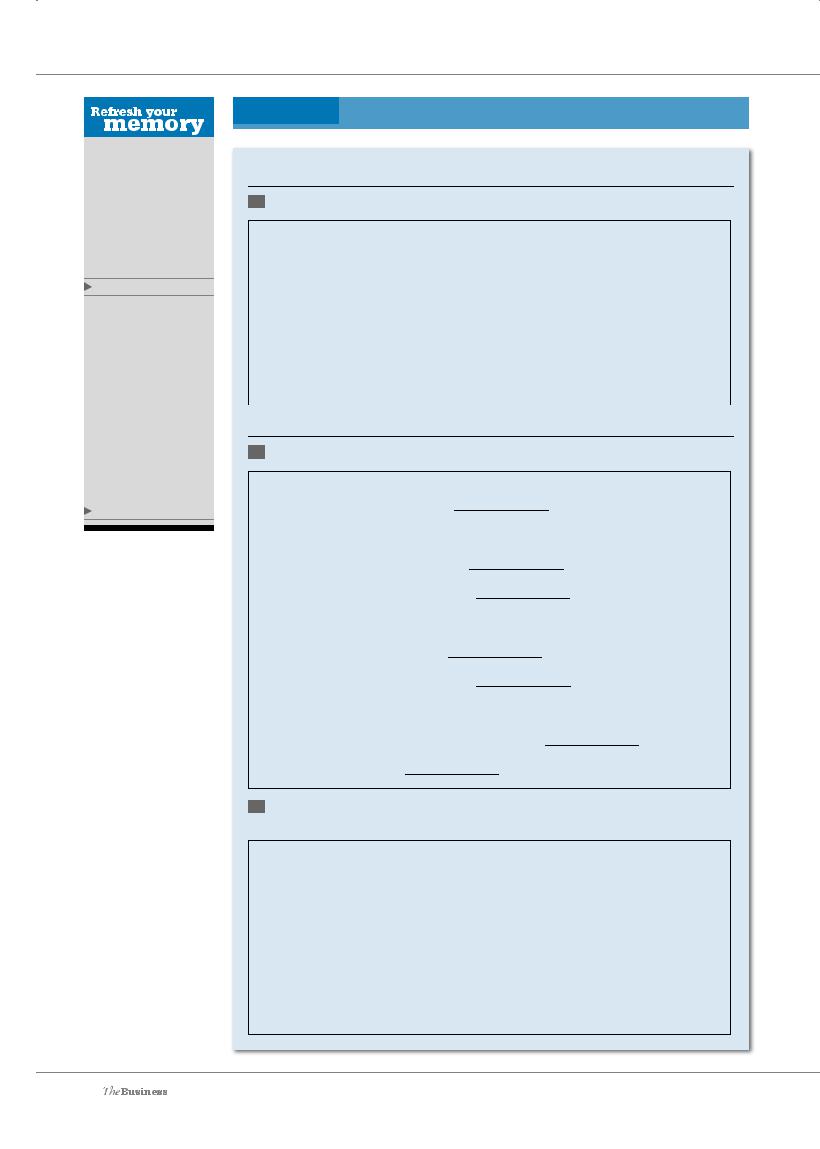
nps1758
.pdf

6  Company and community
Company and community
6.1 About business Corporate social responsibility
Discussion
1 Brainstorm a list of groups of people a company has a responsibility towards. What conflicts of interest are there between the different groups?
Scan reading
2 Read the credo below and identify the four groups of people that Johnson & Johnson prioritize. The words in grey are explained in the Wordlist on pages 155–156.
5
10
15
20
25
30
35
40
70

6.1 About business
Search for the keywords
Starbucks bean stock and Starbucks standards business conduct or CSR
find out more about the social performance of other companies.
Reading and discussion
3 Read Johnson & Johnson’s credo again and discuss who should decide what is meant by:
1 |
maintaining reasonable prices (line 5) |
4 |
just and ethical actions (line 22) |
2 |
making a fair profit (line 8) |
5 |
our fair share of taxes (line 26) |
3 |
fair and adequate compensation (line 14) |
6 |
a fair return (line 40). |
4 Discuss the questions relating to Johnson & Johnson’s credo opposite.
1Which ‘good works and charities’ (line 25) should multinational companies support?
2What kind of ‘civic improvements’ (line 27) should the company encourage?
3How should the company protect ‘the environment and natural resources’ (line 30)?
4Are there any points in the credo you disagree with or items you would like to add?
5Does a credo really change the way a company operates or is it just good PR?
6Do small businesses have the same responsibilities as multinationals?
Listening for gist
5  2:48–2:50 You are going to hear an interview on NPR (National Public Radio), a US news provider, with author Marc Gunther, who believes corporate America is changing for the better.
2:48–2:50 You are going to hear an interview on NPR (National Public Radio), a US news provider, with author Marc Gunther, who believes corporate America is changing for the better.
Part 1 |
|
|
|
|
|
|
|
|
|
|
|
|
|
|||
Listen to Part 1 and complete the summary. |
|
|
|
|
|
|
|
|||||||||
Marc Gunther is interested in companies that treat employees well, (1) |
|
|
and |
|||||||||||||
(2) |
|
|
|
. Nowadays, businesses work closely with (3) |
|
|
and |
|||||||||
many employees are like (4) |
|
|
|
. Starbucks, for example, gave away its bean |
||||||||||||
stocks to (5) |
|
|
. |
|
|
|
|
|
|
|
|
|
||||
The Bush administration does not see (6) |
|
|
|
as a man-made problem. However, |
||||||||||||
US utility companies are (7) |
|
|
and transportation companies are changing |
|||||||||||||
from (8) |
|
|
|
to (9) |
|
|
|
. |
|
|
|
|
|
|||
Part 2 |
|
|
|
|
|
|
|
|
|
|
|
|
|
|||
Listen to Part 2 and answer the questions. |
|
|
|
|
|
|
|
|||||||||
1 Tick the reasons that motivate companies to be responsible, according to Marc Gunther. |
||||||||||||||||
|
profitability |
altruism |
recruitment |
|
|
|
||||||||||
2 Tick the reasons that motivate employees.
They want to enhance shareholder value.
They want to define the company’s goals.
They want their jobs to have meaning. They want to make the world a better place.
3How do Southwest Airlines prioritize the three groups they have responsibility towards?
4What is the theory behind this choice?
5What example does Marc Gunther give of how this works?
Part 3
Listen to Part 3 and decide if the following statements are T (true) or F (false).
1In the 50s and 60s American corporations believed it was their duty to take care of their employees and customers. 
2In the 70s and 80s corporations no longer wanted to take care of employees and customers. 
3Marc Gunther believes the short-term model of the 70s / 80s is sustainable for businesses and for society. 
71

6  Company and community
Company and community
6.2 Vocabulary Meetings, ethical behaviour and social performance
Meetings
1 Match up the phrases you might use in a meeting. |
|
||
1 |
I have received two |
a) |
a copy of the agenda? |
2 |
Has everybody received |
b) |
the meeting. |
3 |
If we can’t agree, I |
c) |
apologies for absence. |
4 |
It’s getting late, so I propose we close |
d) |
the agenda. |
5 |
I think this would be a good time to break |
e) |
a vote. |
6 |
We have lots to discuss, so let’s stick to |
f) |
for lunch. |
7 |
It’s five past nine, so I’d better open |
g) |
side-tracked. |
8 |
Can we start by approving |
h) |
any other business. |
9 |
We seem to have reached |
i) |
handout. |
10 |
That’s interesting, but I think we’re getting |
j) |
the meeting. |
11 |
I’ll just give out this |
k) |
a unanimous decision. |
12 |
Before we finish, we need to deal with |
l) |
the minutes of the last meeting? |
2 Which phrases would you probably use: |
|
|
|
1 at the beginning of a meeting? |
2 at the end of a meeting? |
||
Adjectives
3 Match the adjectives in bold in the article with the definitions below, as in the example.
ELASTIC
ETHICS
It was Groucho Marx who said that if people didn’t like his principles, he had others.
And unfortunately, business people and companies are not always as reliable or as trustworthy as we would like. Product descriptions are frequently not as accurate as they could
be, for example when listing ingredients used in foodstuffs. Service is not always as prompt as we expect, even in socalled fast-food restaurants. But it is perhaps in the world of advertising where ethical standards seem to be the most elastic. Advertisements are frequently deceptive and often confusing or deliberately misleading, sometimes making extravagant promises. No doubt advertisers are neither more dishonest nor any less altruistic than the rest of us; they
do not often make obviously false claims. It’s just that, like Groucho, they sometimes seem a little too economical with the truth.
1 immediate or quick |
prompt |
2willing to do things which are not honest
3intended to make someone believe something that is not true
4appearing different from the way it really is
5able to be trusted as honest
6dependable
7complicated, not easy to understand
8not true
9having a selfless concern for others’ well-being
10correct or true in every detail
72

Further interactive vocabulary practice on the DVD-ROM |
6.2 Vocabulary |
“We could advertise it as 100% salt free.”
Search for the keywords
Rhonda Abrams to read more about Rhonda and her advice for entrepreneurs.
4 |
|
social |
each one |
with |
that |
the words in bold. |
|
|
with |
|
|
|
a different |
an ad hoc |
|
long-term. It can be very valuable for a company to |
|
(3) |
an issue which is related to its business, and to (4) |
funds |
regularly. |
|
|
recognizing |
uphold obey respecting |
|
ON-GOING SOCIAL PERFORMANCE
Obviously a fundamental of HR management is that companies should always (5) the law. But above and beyond that requirement, they have a moral duty to (6)
standards of common decency. This means for example (7) |
human dignity when |
|
there are problems, and (8) |
merit when staff perform especially well. |
|
DAMAGE LIMITATION
The company’s first duty in the case of an accident is to (9) |
the impact of the |
problem on its staff and on the community. It is then essential to (10) |
the |
problem: nothing less than total transparency will do. After the crisis has passed, management should allow sufficient time to (11) a settlement which will satisfy all parties and
(12)the victims properly.
Listening for detail
5  2:51 Listen to a presentation entitled Doing well by Doing good given to an audience of entrepreneurs by Rhonda Abrams, columnist, author and consultant. Tick the expressions you hear.
2:51 Listen to a presentation entitled Doing well by Doing good given to an audience of entrepreneurs by Rhonda Abrams, columnist, author and consultant. Tick the expressions you hear.
respect the environment play a positive role in obeying the law
an honest, responsible business have a competitive edge over
be involved in community causes responsibility to your customer
act with integrity and honesty toward environmental policies
get in trouble with regulatory agencies  face lawsuits or fines
face lawsuits or fines
misleading, confusing, or even false advertising or sales techniques treats employees, customers and suppliers fairly
Discussion
6 Rhonda Abrams talks about ‘being a good corporate citizen’. What specific practices and policies do you suggest this involves in:
•R&D, production and quality?
•marketing and sales?
•HR?
•purchasing?
•finance?
73

6  Company and community
Company and community
|
|
6.3 |
Grammar The passive and reported speech |
The passive |
|
|
|
be + past participle |
Test yourself: The passive |
||
it does |
Ë it is done |
||
it is doing Ë it is being |
|
|
|
|
done |
1 |
Change these active sentences to the passive to avoid mentioning the agent. |
it did |
Ë it was |
|
|
1Your company sometimes releases illegal levels of nitrates into the river.
2Your department is making too many mistakes at the moment.
3Unfortunately, you made a poor decision in hiring unqualified staff.
4Our sub-contractors were employing children to make T-shirts in Asia.
5Several anonymous journalists have accused us of industrial espionage.
6My boss and several other managers had warned the company about the risks.
7We can avoid conflict with the unions by making small concessions.
8The authorities might ask you some delicate questions.
9The Board, the Plant Manager and the trade unions all agreed that production staff should work a four-day week.
10Head Office have decided that they’re going to make 300 employees redundant.
Test yourself: Reported speech
2Complete the extracts from a report of a public meeting about a pollution problem.
1‘Nitrate levels in the local water supply are slightly higher than normal.’
CEO Ben Straw announced that
2‘It is possible that the factory is responsible.’
Mr Straw admitted
3‘There was a small chemical leak last Friday.’
Plant Manager Jane Lee explained
4‘We have taken measures to ensure that this situation cannot reoccur.’
Mrs Lee reassured the meeting that
5‘We are negotiating a settlement with the town council.’
Mr Straw said
6‘We will announce full details in a press statement in a few days’ time.’
He promised the meeting that
7‘Has there ever been a problem like this before?’
Mrs Green, a local resident, asked if
8‘No, I can not remember any other leaks in 30 years at the factory.’
Mrs Lee replied that
9‘When do you plan to re-open the factory?’
Pat Holz, a union representative, enquired when
10‘As soon as possible, but some staff may be laid off for a few days.’
Mr Straw warned that
3Read the following extracts from an interview with the CEO of a multinational oil company. Report the phrases in bold using the verbs in brackets, as in the example.
1‘I repeat what I said a few moments ago: my company does everything it can to limit the impact of our activities on the environment.’ (emphasize)
The CEO emphasized that the company did everything it could to limit the impact of its activities on the environment.
2‘I really can’t accept that. You need to understand that developing countries are extremely grateful for the investment and the jobs that we bring.’ (argue)
3‘I think there’s a slight misunderstanding here. Yes, we do make fair profits and pay good dividends, but we’ve never exploited our employees.’ (explain)
4‘Yes, that’s a fair point: we can, and we will, do more to develop sources of alternative energy such as wind, wave and solar power.’ (accept)
5‘Well, we have little or no influence on government policy on taxation, but no, I do not feel that higher petrol prices will reduce traffic and pollution.’ (comment)
74

Further interactive grammar practice on the DVD-ROM |
6.3 Grammar |
Read the business pages of an online newspaper to find interesting comments and quotes from people and companies in the news. Tell a partner what was said.
4 Read the four extracts from newspaper reports. Then say who made the twelve statements below and explain how you know this. What phrases helped you?
CEO KLAAS ROOS announced an end to manufacturing in Europe, informing shareholders that labour costs could not be justified, and explaining that Asian textile imports could no longer be matched for price.
Journalists are reported to have been refused entry to Plazachem’s Tashkent plant after leakages of toxic chemicals were described by workers. Employees claimed that health and safety regulations had not been applied for the last
five years, and that several fatal accidents had occurred. Plazachem management declined to comment.
Speaking to our reporter on the spot, Ms Gronko explained that all villagers forced to leave their homes by the new road would be compensated. Asked to what level, she replied that she was unable to give a fi gure, but added that discussions were being held with local representatives.
Asked how the company intended to compensate the victims of the accident, Mr Sanchez answered that no decision had yet been reached. Emphasizing the complexity of the legal situation, he suggested negotiations may be protracted.
1 |
‘It’s just too expensive.’ |
7 |
‘It’s too early to say.’ |
2 |
‘It’s dangerous: people have died.’ |
8 |
‘They will be paid.’ |
3 |
‘We’re still talking.’ |
9 |
‘We are closing down.’ |
4 |
‘It could take years.’ |
10 |
‘Your request has been denied.’ |
5 |
‘I don’t know.’ |
11 |
‘We can’t compete.’ |
6 |
‘It’s really not simple.’ |
12 |
‘I’m afraid he’s unavailable.’ |
Listening and reporting
5 2:52–2:57 A manufacturing plant in Kassra, a small town in Algeria, has just made 100 people redundant. Listen to six extracts from a conversation between Geoffrey Bullard, the Plant Manager, and Leila Belabed, a member of the mayor’s staff. For each extract, decide how Leila reported to the mayor, using appropriate verbs, as in the example.
2:52–2:57 A manufacturing plant in Kassra, a small town in Algeria, has just made 100 people redundant. Listen to six extracts from a conversation between Geoffrey Bullard, the Plant Manager, and Leila Belabed, a member of the mayor’s staff. For each extract, decide how Leila reported to the mayor, using appropriate verbs, as in the example.
1I complained that 100 people had been made redundant and I reminded Mr Bullard that he had promised to create jobs for the town.
6Explain these formal announcements to a foreign visitor in informal language.
1Protective glasses must be worn beyond this point.
You have to wear special protective glasses from this point onwards.
2Visitors are requested to use the stairs while the lift is under repair.
3Customers are advised that no refunds will be made without a receipt.
4Deposits will only be refunded after the return of all equipment to reception.
5All meetings are transferred to the training centre during redecoration of the conference room.
6Only expenses which have been approved by a manager will be reimbursed.
Roleplay
7 With a partner, roleplay a conversation between a dissatisfied customer and a salesperson. First decide what the customer bought, and make a list of promises the salesperson made. Use reporting verbs from the boxes, as in the example.
• Verbs with me, e.g. you told me (that)...
tell promise assure ask
• Verbs without me, e.g. you said (that)…
say guarantee claim explain imply state
A:I’m very dissatisfied with this car. You promised me it would do 160 kilometres per hour!
B:No, sir. I’m sorry, you asked me if it would do 160, and I said it would, but only downhill with the wind behind you.
75

6 Company and community
6.4 Speaking Meetings – teamwork
Discussion
1 Discuss how acceptable you find the following gifts from a seller to a corporate buyer.
a corporate pen lunch in a good restaurant a free sample of the product
a case of champagne a free weekend ‘seminar’ on a yacht cash employing a relative
Listening
2  2:58 The management committee of an eastern European manufacturer of electrical components have called a meeting to discuss a problem: one of their buyers, Mr Vieri, has been accepting regular gifts from a supplier.
2:58 The management committee of an eastern European manufacturer of electrical components have called a meeting to discuss a problem: one of their buyers, Mr Vieri, has been accepting regular gifts from a supplier.
Listen to Version 1. How does one member of the committee, Stanislas, behave inappropriately? List five ways.
3Listen again and write down six examples of Stanislas’s inappropriate language.
4 2:59 Listen to Version 2 of the meeting. What are the differences?
2:59 Listen to Version 2 of the meeting. What are the differences?
5Complete the expressions Stanislas uses in Version 2.
1 |
Sorry to |
|
. |
|
|
|
|
|
||||
|
|
|
|
|
|
|
|
|
|
|
|
|
2 |
Would you |
|
|
|
|
, (Anna)? |
||||||
3 |
Sorry, (Anna), I don’t see |
|
. |
|||||||||
4 |
Well, I feel |
|
|
|
|
(we should dismiss Mr Vieri). |
||||||
5 |
I’m afraid |
|
|
, (Jon). |
||||||||
6 |
Yes, but, wouldn’t you |
|
|
|
|
|
(his behaviour was unethical)? |
|||||
6 Reorder the words in bold in these useful expressions for meetings. They were all used in Version 2 of the meeting.
1that to brings next the point us on the agenda.
2that tend think I to we need …
3but I point your see you can’t just dismiss someone …
4think don’t that you everyone should have a second chance?
5we’re think side-tracked getting I here.
6just come here in I could?
7have on views do any you this issue?
8say you when this issue, mean you do our policy on gifts?
7 Put the expressions from 5 and 6 into the appropriate category below.
Giving an opinion |
Asking for opinions |
Managing the discussion |
|
|
|
In my opinion, … |
What’s your feeling? |
Do we all agree on that, then? |
|
|
|
It seems to me that … |
|
Perhaps we should break for coffee. |
|
|
|
|
|
Could we come back to this later? |
|
|
|
|
|
|
|
|
|
|
|
|
Disagreeing tactfully |
Interrupting |
Asking for clarification |
Persuading |
I agree up to a point, but …
Sorry, but could I just |
So, are you saying |
Isn’t it the case that … ? |
say … |
that … ? |
|
76

Interactive pronunciation practice on the DVD-ROM |
6.4 Speaking |
What are the essentials of a successful meeting? Search for the keywords “golden rules of meetings” to find out.
8 With a partner, hold short meetings on the four issues below. Follow the structure provided. Take turns being A and B.
1A vodka manufacturer offers to sponsor your end-of-year party. Do you accept?
2One of your suppliers uses child labour in Vietnam. What should you do?
3Advertisements for your product show only slim, beautiful people. Is that OK?
4Ethnic minorities and the disabled are under-represented in your firm. What can you do?
Student A |
|
|
Student B |
Give an opinion. |
|
|
|
Ask B’s opinion. |
|
|
Disagree. |
|
|
||
|
|
||
|
|
||
Interrupt. |
|
|
Ask for clarification. |
|
|
||
Persuade. |
|
|
Manage the discussion. |
|
|
9 Work in small groups. Hold a management meeting to decide what to do in the following cases of employee misbehaviour in your company. For each case, discuss:
•what action to take.
•what corporate policy to adopt (if any).
•how you will implement your decisions.
Case 1
Mike Ho, a buyer in your purchasing department, accepted cash from suppliers in return for buying large volumes at high prices.
Case 2
Marieta Myska, a sales manager, obtained confidential information about government contracts by having a relationship with a civil servant.
Case 3
Joseph Fisher, a project manager, used company resources and equipment to run a club for disabled children at weekends.
77

6  Company and community
Company and community
6.5 Writing Reports and minutes
Discussion
1 Why should companies invest time and money in community projects?
Brainstorming
2 How many different alternatives can you think of for the words in the box?
but and so say tell think
Skim reading
3 Mirratec Industries, a subsidiary of a multinational manufacturer of compressors for refrigerators and air-conditioning units, has a plant in the small Polish town of Bychawa. Read the report which Mirratec sent to Head Office, and the minutes of a management committee meeting at Head Office, and answer the questions.
1What are the arguments for and against involvement in the community centre project?
2What did a) Head Office and b) Mirratec decide?
Bychawa Community Centre project
EARLIER this year Mirratec was asked to invest in a project to build a Community Centre in Bychawa. As a rule, group policy is to give encouragement but only limited fi nancial support to such community projects. However, a meeting was held by managers and staff at the plant and in this case it was thought that the benefits to the company’s image justified more active and extensive support, in particular after the recent difficult negotiations with the local authorities over the access road to the new workshop. Moreover, it was felt that employee involvement in the project would bring substantial benefits in terms of motivation and job satisfaction. Consequently, it is recommended that the company should contribute 50% of the funding; in addition, selected employees should be assigned to manage key areas of the project
during work time, such as design, fund-raising and construction.
Naturally, the project will require a high level of commitment from our staff in order to complete all stages on time. The community centre will be officially opened in September, and it is hoped that department managers will be able to reduce staff workloads for the duration of the project.
In conclusion, it is believed that the community and the company will derive numerous benefits from the project and that overall, the company’s image within the community will be greatly improved. It is expected that an ongoing close relationship with the community will have a positive effect on two strategic areas of our development, namely expansion of our manufacturing facilities and recruitment of our workforce locally.
Minutes of the Management Committee meeting, 15 April
Attendees: Jan Navratil, MD; Ines Caba, Production; Christopher Taberley, Finance
1.Bychawa Community Centre. JN reported that the plan had been favourably received at Head Office. Even so, there were concerns about the size of the investment and the project’s impact on productivity. But he stressed that group management were aware of the need for good relations with local communities, and would support Mirratec’s decision. Consequently, JN felt that they should go ahead.
IC agreed that it was important to improve public relations, but emphasized the risks involved for production, for example, absenteeism and quality issues. She claimed that the project could become an excuse to take time off work, especially during the construction phase in the summer.
CT reminded the meeting that only a small number of employees would be concerned. Obviously department managers would have to organize cover for any absences. In other words, production should not be affected. Furthermore, managers of other departments were very happy with the project on the whole. In brief, he suggested that the benefits in developing team spirit were clearly far greater than any potential risk to productivity.
Finally, it was agreed that the project should be approved.
78
